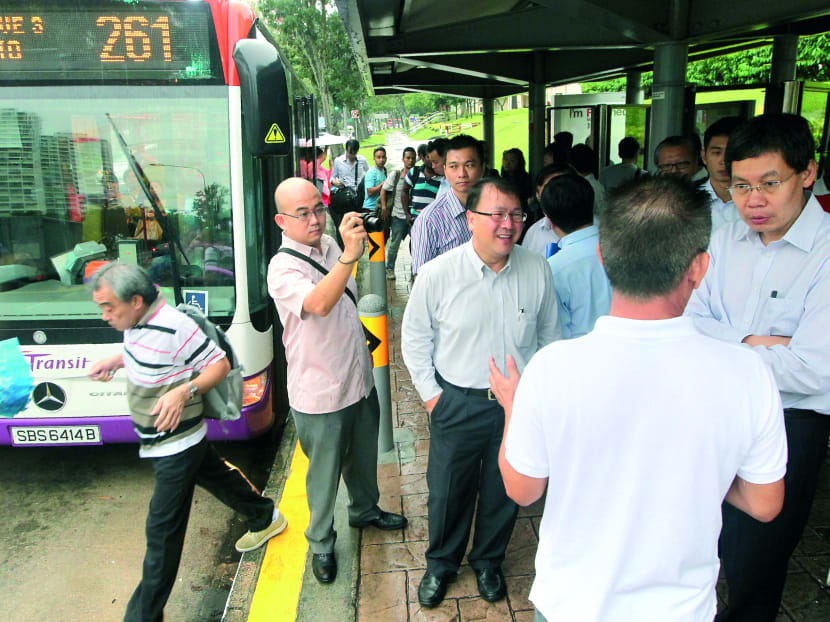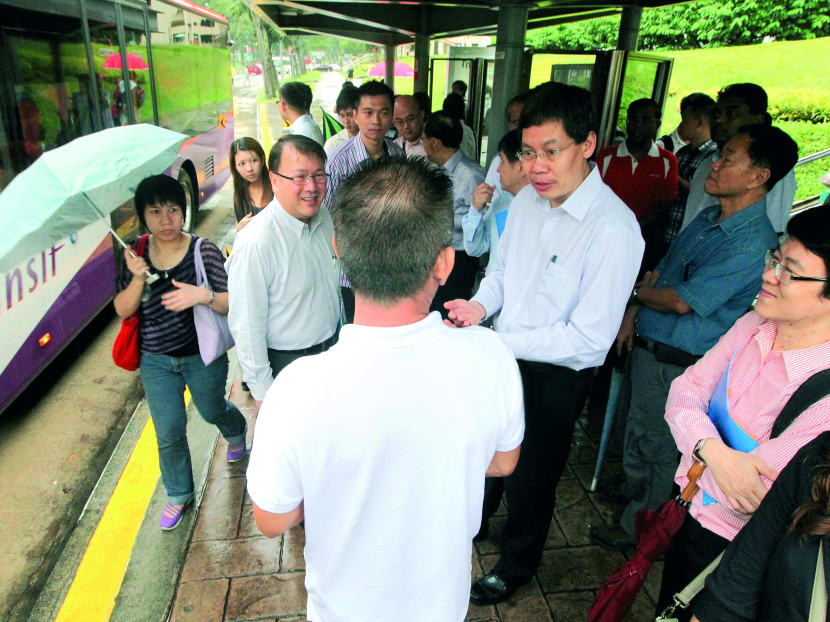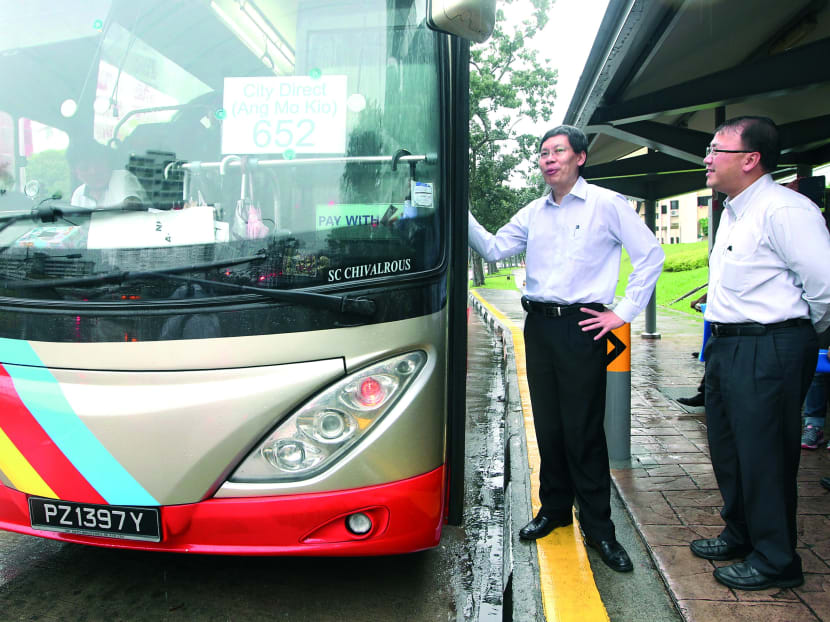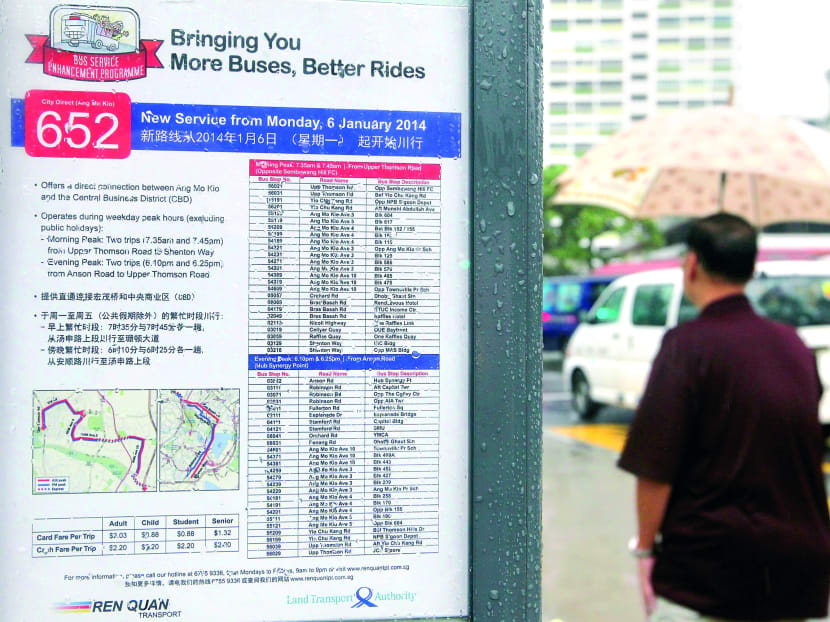Rewards, fines to improve bus service reliability
SINGAPORE — Public bus operators stand to gain between S$2,000 and S$6,000 for improvements to 22 services if they consistently arrive at bus stops according to schedule — a move aimed at addressing commuters’ long-standing complaints that two or more buses arrive at the same time, resulting in a longer wait for commuters afterwards.




SINGAPORE — Public bus operators stand to gain between S$2,000 and S$6,000 for improvements to 22 services if they consistently arrive at bus stops according to schedule — a move aimed at addressing commuters’ long-standing complaints that two or more buses arrive at the same time, resulting in a longer wait for commuters afterwards.
SMRT and SBS Transit will also be fined between S$1,300 and S$4,000 if they fail to meet standards under the Bus Service Reliability Framework to be piloted by the Land Transport Authority (LTA) for two years.
Announcing details of the scheme yesterday, Transport Minister Lui Tuck Yew said the goal is to get buses to arrive at the bus stops at more regular intervals. “Today, we measure their departure from the interchange. That is one way of measuring it, but I think for the commuter who is waiting en-route, the more important thing is, ‘Do the buses arrive regularly at the bus stops they are waiting at?’,” he added.
The Public Transport Council currently tracks bus departures from the interchange, and operators have to ensure that 85 per cent of their services leave the interchange not more than five minutes from the scheduled frequency. Under the LTA’s framework, each 0.1-minute deviation from their scheduled arrival at bus stops will be measured against a baseline for the route and go towards determining the monthly reward or penalty to be imposed.
The trial will start in February and March with 15 services — eight SBS and SMRT’s seven — before another seven are brought into the fold. Calling the framework a significant change to bus operations, the LTA said there would be no incentives or penalties imposed before the end of May to allow the operators time to adjust. Incentives and penalties would be assessed and handed out to bus operators on a biannual basis after the phase-in period, the authority added.
Transport analysts welcomed the scheme as they felt public buses operate under challenging conditions. “Even with the expansion of bus lanes, they still do not have absolute priority,” said Professor Lee Der Horng from the National University of Singapore’s Department of Civil and Environmental Engineering.
However, Dr Park Byung Joon, who heads the Urban Transport Management Programme at SIM University, cautioned that traffic conditions might be out of the control of operators. “Bus drivers may be under pressure to speed up if the buses (they are driving) fall behind schedule,” he said.
The LTA said operators would need to enhance their en-route management of bus operations. This would involve guiding bus drivers who are on the road, in order to regulate travelling speed and reduce long gaps between consecutive buses. “On occasion, buses may be required to wait for up to a minute or two at bus stops, as long as they are not causing obstruction, in order to regulate intervals,” the LTA added.
Yesterday, Mr Lui also gave an update on the Government’s S$1.1 billion Bus Service Enhancement Programme (BSEP). By the end of last year, 291 buses — or more than half of the 550 buses to be funded by the Government — have been put on the road. The remaining 260 buses would be rolled out by the end of the year.
Mr Lui said waiting times have been shortened by three to five minutes for some bus services, while those with persistent crowding during peak periods have been reduced by 70 per cent to 30 services.
Commuters interviewed had mixed reactions to the BSEP report card. Although they saw a reduction in passenger loads, reliability was still an issue for some commuters. “I can now (board) the bus ... but my waiting time has not improved,” said IT executive Danny Tan, 33, who travels from Whampoa to his workplace in Buona Vista. “I still wait at least 10 to 15 minutes for the bus.”
Investment banker Eric Chia felt more should be done to give buses the right of way on roads. “I don’t think the authorities should pat themselves on the back yet. Commuting by public transport during peak hours can still be harrowing due to the unpredictability of services and traffic conditions,” he said.
Mr Lui pledged to do more. “We intend to do more this year and expect to be able to improve on this,” he said.






